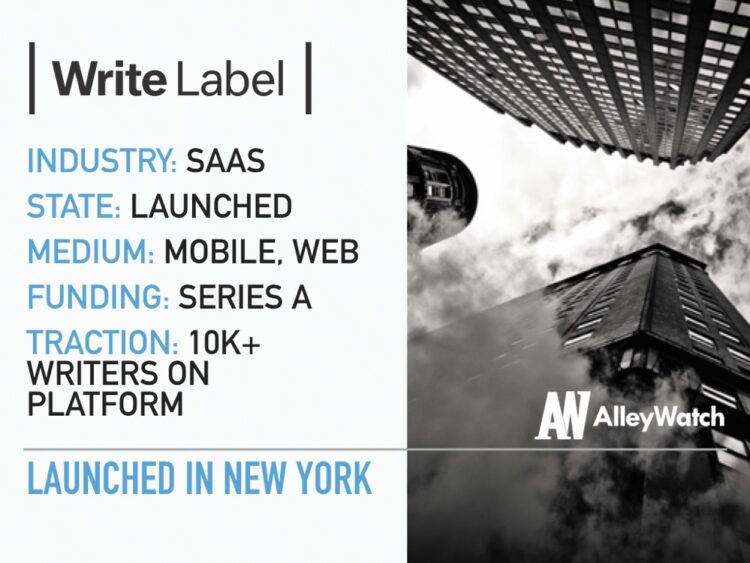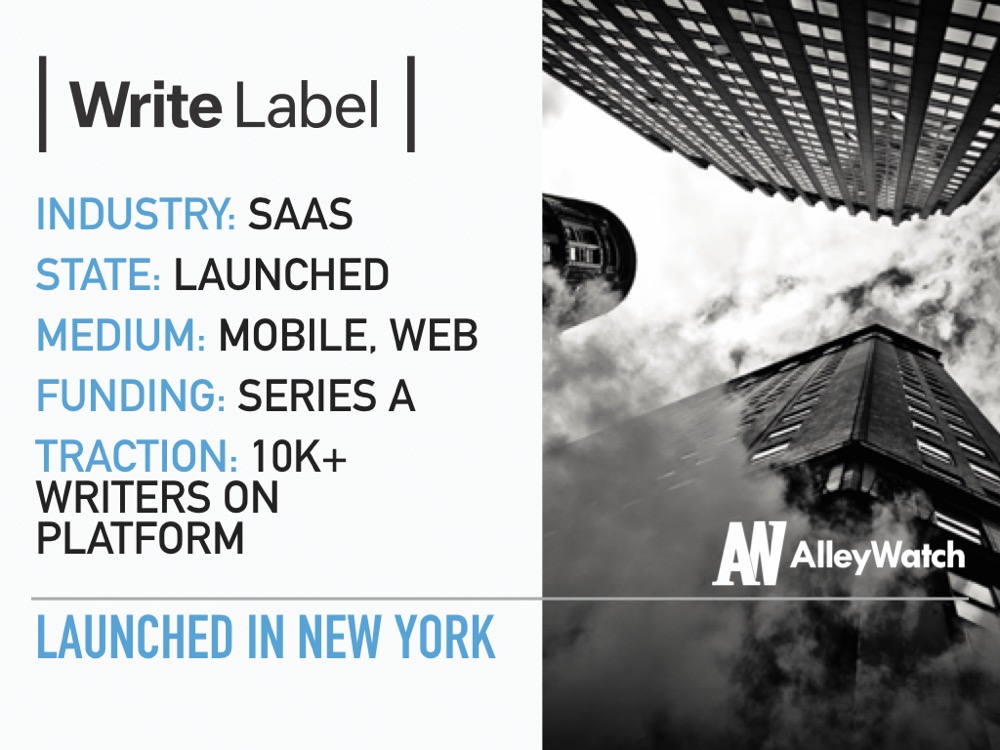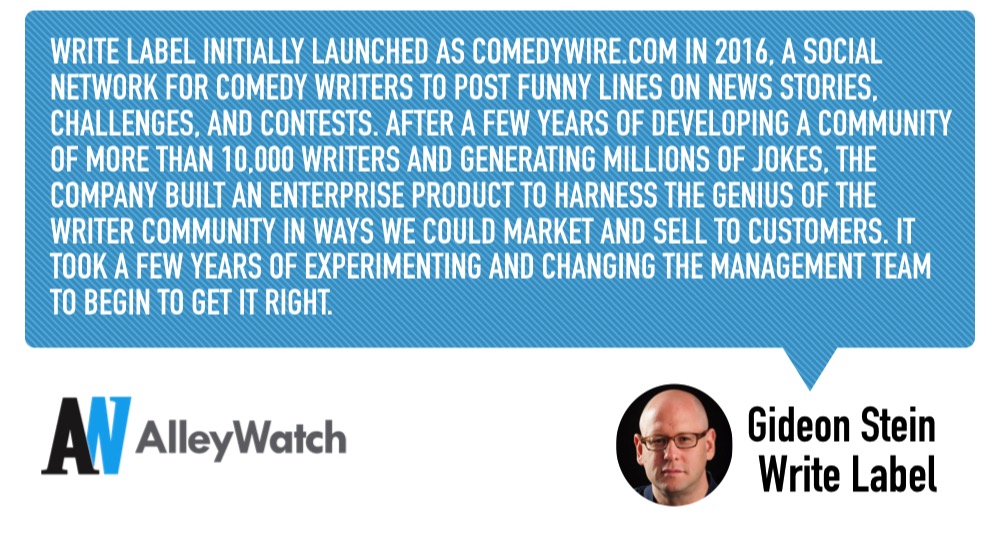More than one-third of Americans are active participants in the gig economy, and according to an Upwork survey of 6,000 people, 64 percent of freelancers found work online. Write Label, the crowdsourced platform for short-form writing, is strategically positioned to connect the best creative writers with potential projects that include ad scripts, social media campaigns, and even executive speeches. Write Label is highly selective and chooses only the best writers, and its machine learning platform gives clients insight by matching the best writer submissions to every project. Major media companies like iHeartMedia, NBC Universal, & Spectrum have used Write Label.
AlleyWatch spoke with founder Gideon Stein about creating the crowdsourcing platform that is taking the gig economy to a whole new level.
Tell us about the product or service that Write Label offers.
Write Label is a crowdsourced platform for on-demand short-form writing. The Write Label name plays on the concept of white label services, and it positions the company as the solution for creative writing needs, providing customers with quick access to high-quality custom content. We have thousands of writers segmented by industry and product type – some are great at creating engaging social media posts for brands, while other writers excel at cranking out clever copy for fitness studios. Our clients get a customized UI and we develop a tailored brief for their specific use case. The platform is powered by creative people, but it also harnesses data by vetting every writer and piece of content using machine learning to determine the best work for every project, giving clients instant insight into idea performance. Projects have included radio ad scripts, greeting card copy, social media campaigns, and executive speeches.
How is Write Label different?
Write Label offers an affordable and fast alternative to traditional ways of ideation and content creation. Instead of depending on a small team of creatives, clients can access thousands of contributors. There is a huge diversity of backgrounds and experiences, which leads to very unique voices and brings a variety of authentic ideas. Since there are so many contributors, there are always people online ready to run with a brief and turn it around quickly.
The reason why we’re able to deliver such high-quality content so quickly and cost-effectively has everything to do with the sophistication of our platform and our ability to route specific tasks to a discreet set of writers, who are best able to deliver for that client. We also train our writers, whether they’re in Toledo or Thailand, on how to write specifically for each client. Sometimes it takes a bit of iterating, but we’ve been amazed by how well we’re able to deliver consistent results.
 What market does Write Label target and how big is it?
What market does Write Label target and how big is it?
Write Label has been focused on serving the terrestrial radio and broadcast TV advertising markets. Together, they represent more than $50B annually in ad spend. While the creative is only a piece of that, it still represents a multi-billion-dollar industry. We’ve just launched new business development initiatives targeting digital media, which is expected to be more than $130B in 2019. We also work with CPG, real estate, and greeting card companies– the work we do can be adapted to any industry.
Who do you consider to be your main competitors?
Our closest competitors include freelance platforms like Fiverr, Upwork, and writing services like Contently, Freelance Writing, etc. However, we’ve taken a decidedly different approach to the market. Write Label’s platform sets itself apart in how we assign tasks to groups of writers based on demonstrated skill and how we foster competition among the creatives to encourage better results.
What is the business model?
The model is using crowdsourcing to increase creativity, productivity, and the success of advertising, social media, and other needs for creative content. Crowdsourcing is not a gimmick; it is a real business solution with many applications.
What inspired the start of Write Label?
Write Label initially launched as Comedywire.com in 2016, a social network for comedy writers to post funny lines on news stories, challenges, and contests. After a few years of developing a community of more than 10,000 writers and generating millions of jokes, the company built an enterprise product to harness the genius of the writer community in ways we could market and sell to customers. It took a few years of experimenting and changing the management team to begin to get it right.
What are the milestones that you plan to achieve within six months?
In addition to working directly with sales teams at more traditional media companies, we’ve developed a set of APIs to embed our platform directly into self-service platforms for ad-based technology companies. While it’s great to be able to go online and purchase advertising services directly to get in front of your audience, the one thing lacking from virtually every self-service ad platform – including those from Facebook, Twitter, Spotify, and Snap – is a way to request and approve a professionally scripted ad. Write Label is really the missing link for all of these platforms and we want to help them help their customers.
What is the one piece of startup advice that you never got?
Multiply all cost and time estimates by Pi (3.14159).
If you could be put in touch with anyone in the New York community who would it be and why?
I’d love to talk to the heads of traditional ad agencies. We have a very flexible, cost-effective, and high-quality platform that can help them serve their clients at a higher level with a much lower cost structure.
I’d love to talk to the heads of traditional ad agencies. We have a very flexible, cost-effective, and high-quality platform that can help them serve their clients at a higher level with a much lower cost structure.
Why did you launch in New York?
New York City is a great place to launch and run a business. We have access to superlative talent, a lot of our media company clients are based here, and I happen to live here, too.
What’s your favorite restaurant in the city?
Pearl Oyster Bar. I’ve been going for more than two decades and it’s just as good as when it opened up in the 90s. The fried oysters, lobster rolls, shoestring fries, and Caesar salad exist on another level and the staff knows us. What could be better?





